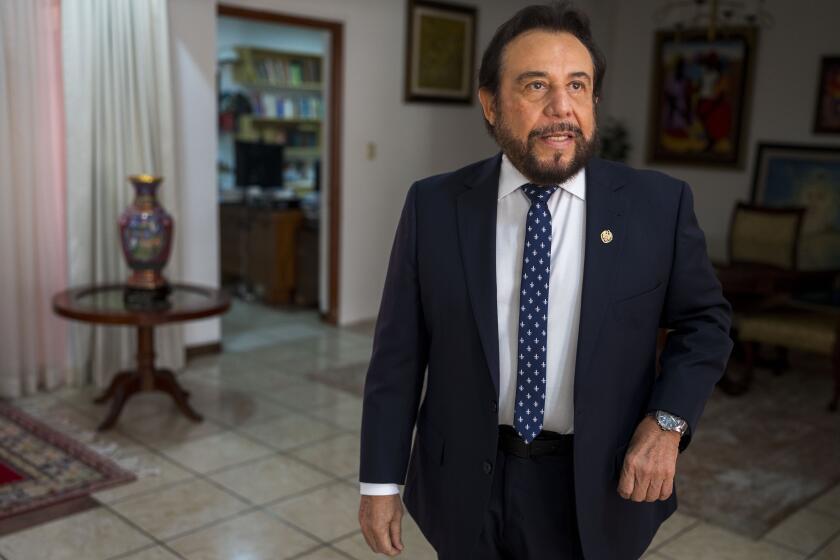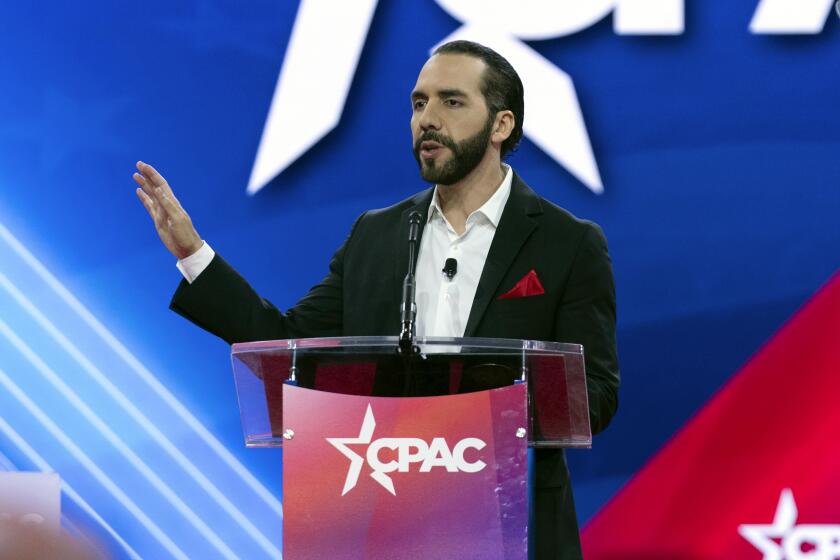El Salvador’s former leftist strongholds contemplate party’s demise

- Share via
SAN JOSÉ LAS FLORES, El Salvador — Nestled in the mountains of northern El Salvador, near the Honduras border, San José Las Flores has been a bastion of leftist resistance for decades.
Now its residents, many veterans of the country’s civil war, fret over the seemingly imminent demise of the Farabundo Martí National Liberation Front, the party born of the conflict and a powerful national political force for three decades.
The party’s bright red flags still flutter from light poles along this town’s sloping streets, but the FMLN is on its last leg, devastated politically by its own ineptness in governing, shameful corruption and the scorched earth politics of President Nayib Bukele, the millennial force of nature it initially launched.
In only five years, the FMLN went from holding El Salvador’s presidency to garnering a paltry 6% of the vote a month ago as Bukele romped to reelection. Worse still, for the first time since its inception the FMLN will not have a vote in the Legislative Assembly, having been completely shut out in congressional elections.
El Salvador’s president, Nayib Bukele, accused of dismantling democracy, is likely headed to a second term, even though the constitution prohibits reelection.
“These results show that they don’t represent any important sector of the population anymore,” said economist and political analyst Julia Evelyn Martínez, who tried to launch her own coalition candidacy against Bukele. “The FMLN has a revolutionary, socialist discourse and it attracted a lot of people, professionals, university students, because it had a leftist agenda, certain principles that the people said, ‘I identify with this.’ But now that has all been lost.”
The conservative Nationalist Republican Alliance (ARENA), is not far behind. It won only two congressional seats in the 60-seat Legislative Assembly. Its last two presidents were jailed for corruption. The combined bungling of those two traditional parties created the vacuum that Bukele walked into.
For the FMLN, what had remained were a handful of municipalities like San José Las Flores in Chalatenango. But Bukele and his allies have come for those too. El Salvador’s congress, already under his sway, passed reforms last year that reduced the number of municipalities in the country from 262 to 44. Following Sunday’s municipal elections, the FMLN lost the 10 municipalities it had controlled for several decades in the Chalatenango department, a historically stronghold of the guerrilla movement.
On a recent day, a bright blue banner hung over a street here urging voters to support the candidate from Bukele’s New Ideas party.
El Salvador’s vice president denies accusations that the administration of President Nayib Bukele has made undemocratic moves to consolidate power.
Modesto Ayala Zamora, a 55-year-old ex-combatant of the now-defunct Popular Liberation Forces guerrilla force, dismissed recent elections as a fraud — Bukele ran despite a constitutional ban on reelection — but recognized the toll on the FMLN.
“We’re sort of between a rock and a hard place, a bit beaten down,” he said. “They are going to continue beating us, they will keep trying to make us disappear. We are not going to disappear, because we’re going to keep fighting even though it is difficult.”
Ironically, the FMLN gave Bukele his political start. He won the mayor’s office of Nuevo Cuscatlán as a 23-year-old political neophyte and then San Salvador’s top post. Then, seeing the opportunity to chart his own path as a populist, independent of the country’s increasingly discredited traditional parties, he engineered his ejection from the FMLN and went for the presidency.
From the presidency Bukele has railed against FMLN corruption and pursued its former leaders. The FMLN’s last president, Salvador Sánchez Cerén, fled to Nicaragua with his family to escape prosecution. He joined his predecessor Mauricio Funes, who also received asylum and eventually Nicaraguan citizenship after being accused of massive corruption in El Salvador.
El Salvador’s social services agency says more than 40,000 children have had one parent or both detained in President Nayib Bukele’s nearly two-year war on gangs.
In January, Bukele, who excels at spectacle, demolished the massive Monument to Reconciliation erected under Sánchez Cerén’s administration to mark the 25th anniversary of the peace accords that ended the civil war. He wrote on the social platform X that it had “glorified the pact between murderers of our people to divide the cake among themselves.”
Seated behind a simple desk in her small office, San José Las Flores Mayor Buenaventura Tobar conceded that Bukele’s relentless accusations of corruption within the FMLN party had shaken it.
Tobar, 54, has been affiliated with the social base that produced the FMLN party since she was 15 years old. Now finishing her second three-year term as mayor in a town with few resources — one primary school and no gas station — she insisted the party could recover even while recognizing the damage.
“That message [of corruption] really resonated, reached a lot of sectors, reached the veterans, reached the whole population and that made our people believe it in some way and to start to hate the party,” Tobar said. “It penetrated the base and all of our sympathizers and our friends, causing them to lose confidence in the party.”
Nayib Bukele told the gathering in Maryland the next U.S. president ‘must do whatever it takes’ to ‘unapologetically fight’ what he described as ‘dark forces.’
To regain that trust, Tobar said the party’s leadership had to regroup and listen to the base. But so far, there has been no guidance from the party’s leadership about how to reverse last month’s electoral disaster that left them without a voice in Congress, she said.
“We have to really think about that, it’s the first time we’re left without representation, but it’s also an important message that we have to assess,” Tobar said.
Sitting in the shade of a tree for relief from the relentless heat, Felipe Tobar — no relation to the mayor — said he saw a very difficult future for the FMLN.
“The work of the FMLN has been in decline; I feel like if the FMLN does not overcome these problems, it’ll soon be snuffed out,” said the 66-year-old community leader. “I am disillusioned, not of the party, but of some leaders.”
He added that maybe the best thing would be to “organize another leftist party.”
More to Read
Sign up for Essential California
The most important California stories and recommendations in your inbox every morning.
You may occasionally receive promotional content from the Los Angeles Times.














